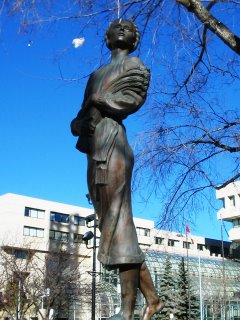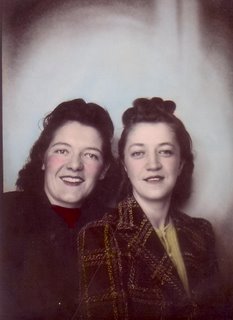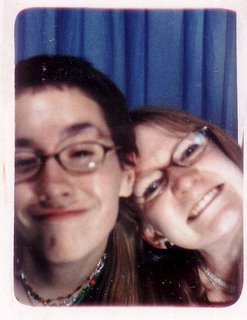 [disclaimer: this entry is evidence that sadness amplifies my distaste & frustration quite substantially... it is an accumulation of notes i've written during periods of un-sleep, dealing with last December's Orange Revolution in Ukraine & the fact that I've heard we're voting again in January. yes, it's a little angsty. ]
[disclaimer: this entry is evidence that sadness amplifies my distaste & frustration quite substantially... it is an accumulation of notes i've written during periods of un-sleep, dealing with last December's Orange Revolution in Ukraine & the fact that I've heard we're voting again in January. yes, it's a little angsty. ]About a year ago, I was so inspired by Ukraine’s Orange Revolution. I would see the pictures of bright flags waving in Maidan Neznalezhnosti, & I wanted to be there so badly. I thought of my grandparents’ families in Nebyliv, all probably taking the train to L’viv just to be there, & I thought, they’re having a revolution & I’m writing theoretical papers. It was stirring. I would get little tears in my eyes every time I heard Shche ne vmerla... It was all my idealistic & naïve little heart could have wished for – a revolution in my foremothers’ country! Here I was seeing them live out the pattern they’ve always repeated throughout their history as a nation: the fight to end corruption & become independent.
It was a peaceful protest, & everyone mobilized. There was so much hopefulness, determination, that beautiful liberated attitude of to-hell-with-it-all-we-have-nothing-to-lose-&-so much-is-possible... I loved hearing the stories of babas making tea with jam to serve to the freezing protesters, & loved reading the
Ukrayinska Pravda &
Pora blogs written by students who updated many times a day with such immediate & glowing words. I loved knowing that there were people huddled by fires singing folksongs, & that musicians were inspired to create new things to sing; dissent was weapon-free & stronger for it; so firm, so decisive, so communal & so charismatic. & when another election was held, & Yushchenko’s ‘pro-democracy’ alliance came through, it seemed it had been effective.
It was effective in the sense that Yushchenko was fairly elected. People protested, their government, & so much of the rest of the world listened. But then things started to fall apart. Yushchenko got a little too pro-American-capitalism for many people’s liking, & the Ukrainian economy also suffered. He insulted the groups like
Pravda &
Pora (who were quite instrumental in organizing the whole revolution thing) for daring to criticize him. He sacked most of his cabinet in September, including a former ally, Yulia Tymoshenko (his main supporter in the elections & also very instrumental in the revolution). He seems to be getting sketchier & sketchier. I mean, he never seemed completely sound, but compared to Yanukhovych, he was benign. However, it’s clear that he’s seemingly just another politician, corrupt in his own little way.
I can’t imagine how this must feel to the people who organized the revolution, to see everything fading & dimming & crumbling so quickly. I try to be positive, when I look at the fact that the Revolution’s activities inspired the development of new political parties, diversifying the options for many people. Civic activism is still strong, with many campaigns and actions to force the shaky government into taking responsibility for economic policy and improving environmental protection and challenging urban development. The free press – papers like Olena Prytula’s Pravda – seems to be flourishing. Compared to Soviet times, this is very, very hopeful.
However, I cannot ignore the glaring fact of how this situation is yet another flashing reminder of how all government, is deeply flawed & even in a ‘democracy’ we are ultimately at the mercy of the wease-ish personalities in power, regardless of who they are, & whether we elected them or not. & so I am caught between frustration with administration & the admission that the Revolution did give me some hope for grassroots movements.
Maybe it still gives me hope because it’s a striking contrast to here; in Canada the majority of the population seems mostly disinterested in politics. I am not saying that there aren’t any very dedicated civic action groups, because there definitely are. I am just saying that whereas the overwhelming majority of Ukraine’s 50-some million people were involved in the Orange Revolution, whereas here, the priorities of the average person (especially in St. Albert) sound much like this:
“I’m not going to vote in the January election. Are you crazy? It’s too cold to go outside! But I will go out when it’s -40 to put gas in my S.U.V. & then I’ll go to the mall & spend lots of money on a plasmatic television and watch reality tv & lots of sensationalist American news produced by mass corporations!”
(So I guess winter camping in a downtown square with little shelter is out of the question...)
The apathy of the general public is surpassed only by that of the visionless & self-absorbed politicians themselves. Maybe they aren’t doing anything actively malignant & war-like to the rest of the world, but what are they really doing that’s productive? Ignorant little oil-vampires in this province, we’ll never get enough left-wing power in the government to ever really get any change, it seems. I could scream. & look at the messes even within Canada, the disparities & unwillingness to profoundly deal with certain issues (especially Indigenous rights) -- certainly, they toss a little money around every once in awhile, but they aren't active enough.
I used to feel that it was important to protest regardless of anything, as an exercise of one’s democratic rights. But in a democracy a government is supposed to be accountable to the people, there is some sort of contract there. But they haven’t been listening in the past. Look at the war, this war that’s gone on despite outcry from everywhere. If there were to be another protest tomorrow, I’d hesitate to go. On one hand, I want to show support for what I personally believe in; because I do not want to be mistaken for supporting something through complacence or inaction. (Thus, I’ll vote in January, because I still have a kernel of futile hopefulness...) However, it is sort of a dilemma, because I also feel that protest signifies you actually trust your government, your elected representative, to actually
DO something about your concerns. & that seems pretty futile around here. A politician? Listening to someone? Well,
maybe after they finish 'forgetting' where they put their money, stop ignoring poverty & unclean drinking water (in a country the U.N. likes to vote one of the best places in the world to live!), and wrap up a few rounds of golf....
It basically seems that they’ve decided that having another election would be fun, they’d get to do even less real work & even more travel paid for by taxpayers! Super! Who can come up with the emptiest platform this year? Or pay their friends to do it? Who can think of more bills that have already been passed, that we can waste time & money voting on again?
According to my historical sources (ie: my parents), I get two different readings of Canada’s past government action. My dad believes that we’ve lived in a state of perpetual weasel-dom since as long as he can remember, and for pretty much all of the history he’s ever read; my mom says that politicians used to actually get things done & people cared about politics once upon a time, like when Diefenbaker & Trudeau were around. I don’t know what to think, really – I’ve read the history, of course, but I fear my second-hand views have already been skewed by my parents & Trudeau-loving high school social teachers’ recollections of such things.
I don’t know what the answer is. I’ll vote. I’ll keep on writing letters to political representatives when I’m annoyed with them, & I’ll keep recycling the stupid patronizing form letters & propaganda that their representatives occasionally send back. Maybe I will be able to just accept the fact that politics are silly, but thinking politically on an individual basis is not. & then maybe I will slowly become less frustrated, and more serene, about the things I cannot change. & I will keep doing all the things I do that I believe are important to living in a sustainable, aware way, & make little changes when I can. I have a very dear friend who manages to live this way, and it is quite inspiring to me. I wish I could be more like him. I see it as a form of benevolent anarchy, as a symbolic kick in the shins to weasels everywhere. So I will try to stop over-thinking this & indulging in this angst, & try to do my very small little things.
But, to conclude my angst, I shall just say that I will feel very cranky & very cynical while voting in January. & weirdly nostalgic at Christmastime, thinking about the Ukrainian vote. How it could've signified the start something even better... but became a one-step-forward-at-least-half-a-step-back sort of thing. Which I suppose isn't bad to start with...
(& thus, my idealism isn't dead yet! in fact, it thinks it will get up & go for a walk!)*ps: that statue in the photo is the one by city hall, made to honour ukrainian pioneer women., called 'the madonna of wheat'... with that sheaf of wheat & heavenward gaze, it is quite kitschy & makes me think of a combination russian 'motherland' propaganda, & i don't know quite to make of it. i admit i find it a tiny bit endearing. maybe i feel sorry for because when i took the photo, there was birdshit on her head...








